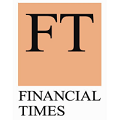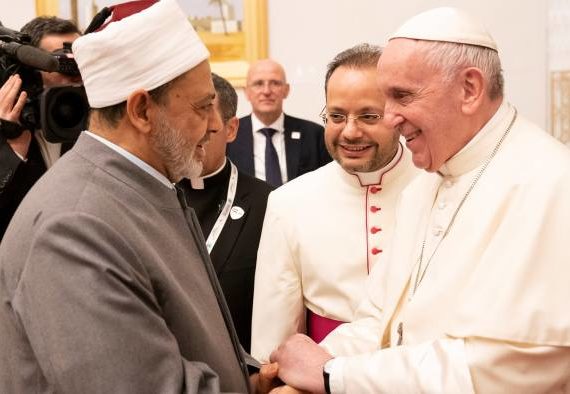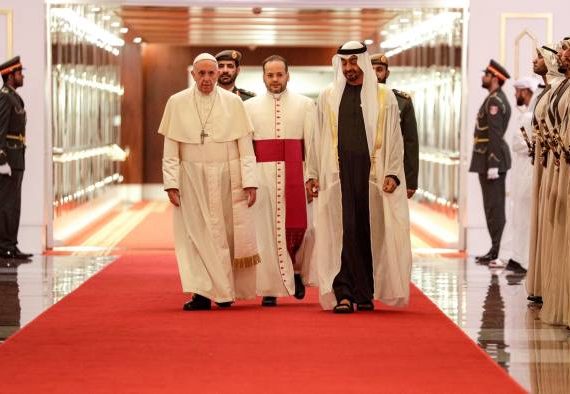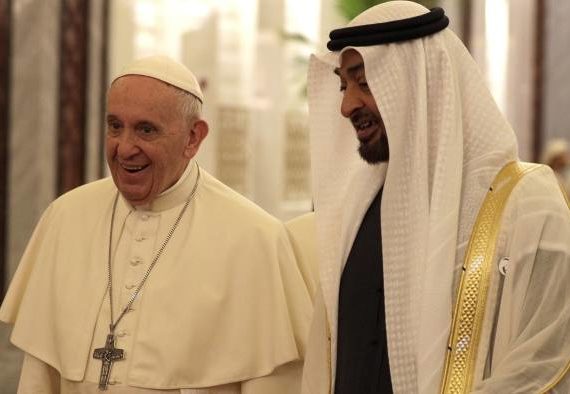
The Financial Times
By Simeon Kerr
February 3, 2019
Three-day trip will include open-air mass for 135,000 Catholics

Pope Francis greets Sheikh Ahmed Mohamed el-Tayeb, grand imam of al-Azhar mosque in Cairo, at Abu Dhabi airport on Sunday evening © Reuters
Pope Francis arrives in Abu Dhabi on Sunday for the first papal visit to the Arabian peninsula, a trip that the UAE hopes will burnish its reputation for religious openness.
Despite persistent criticism of its intolerance of political dissent, the expat-dominated UAE has a long tradition of peaceful interfaith relations and is home to almost 1m Catholics.
In a statement ahead of his visit, the pope said the UAE was “striving to be a model for coexistence, human fraternity, a meeting of faiths and civilisations”.
His three-day trip will include open-air mass for 135,000 Catholics, billed as the largest act of Christian worship in the Arab world.
“This visit will allow the world to appreciate the UAE’s advocacy for multiculturalism and living in mutual respect and its openness to all religions,” Sheikh Nahyan bin Mubarak al-Nahyan, the minister of tolerance, said ahead of the pope’s arrival.
Despite Abu Dhabi’s efforts to promote itself as beacon of tolerance in a region where religious minorities face persecution, its role in the war in Yemen has amplified concerns over its crackdown on opposition and free speech.

Pope Francis is welcomed by Abu Dhabi’s crown prince Sheikh Mohammed bin Zayed Al-Nahyan on his arrival at Abu Dhabi airport on Sunday evening © AFP
Devin Kenney, Amnesty International’s researcher on the UAE, said the country was casting the papal visit as proof of tolerance. “Yet the Emirati government is completely intolerant of peaceful dissent and criticism,” he said.
Abu Dhabi seeks to separate discussion of politics from religious tolerance, said Taufiq Rahim, a senior fellow at New America, a think-tank. “The UAE is about coexistence of expatriates and locals,” he said. “So the leadership sees no contradiction in terms of political transformation, or the lack thereof.”
The UAE’s de facto ruler Sheikh Mohammed bin Zayed al-Nahyan, architect of the country’s campaign against radical Islamism has also spearheaded interfaith dialogue, renaming a mosque in the capital after Jesus’ mother, Mary.
Judaism, long practised in secret in the UAE, is also now being more openly recognised. Expatriates and visitors discreetly use a villa in Dubai as their synagogue and there are discussions about formalising a public space for Jewish worship.

The pope and the crown prince of Abu Dhabi: the UAE has a population of around a million Catholics, most of them expatriates © AP
While the UAE has no diplomatic relations with Israel, there is growing co-operation with the Jewish state to build an informal alliance against their common foe, Iran.
“There is a shift in the Gulf to develop Jewish communities as states here engage more in interfaith activity — but it is also a result of warming relations with Israel,” said Rabbi Marc Schneier, who is speaking at an interfaith conference running alongside the pope’s visit.
Catholics have been snapping up free tickets for Tuesday’s two-hour mass at a football stadium, receiving goody bags of white T-shirts, caps and commemorative mugs.
“It will be a blessing to see the pope,” said Cameroonian expatriate Jude Nsame. “Everyone in white, to show we all worship one God.”
Pope Francis will also meet Muslim leaders such as Ahmed el-Tayeb, the Grand Imam of the Al-Azhar Mosque in Cairo.
The pope’s predecessor, Pope Benedict XVI, sparked a furore in the Islamic world in a 2006 address that suggested a link between Islam and violence.
After becoming pope in 2013 Francis sought to mend interfaith ties by washing the feet of Muslim refugees in what he called “an act of brotherhood”.
“Pope Francis has brought a breath of fresh air compared to the more confrontational approach of his predecessor,” said Hugh Goddard, honorary professorial fellow at Edinburgh University.
Copyright © 2025 Foundation For Ethnic Understanding. All rights reserved. | Privacy Policy